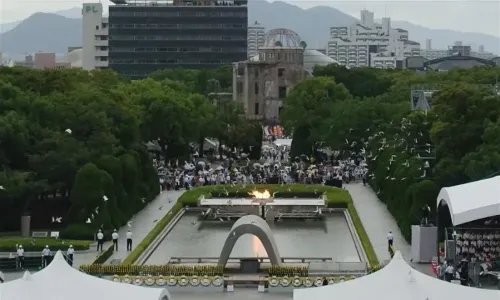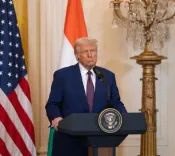Is Suspending the Indus Waters Treaty a Strategic Move After Pahalgam?

Key Takeaways
- India has suspended the Indus Waters Treaty in response to terrorism.
- This decision marks a strategic recalibration of India's approach to water resources.
- Suspension allows India to prioritize its national interests.
- The treaty's outdated framework necessitates a review.
- India aims to enhance domestic water management and infrastructure.
Bhupesh Chaudhary
The recent terrorist attack on innocent tourists in Pahalgam, Jammu and Kashmir has once again highlighted the persistent issue of cross-border terrorism, raising critical questions about India's response strategy. Each incident involving bloodshed on Indian soil, perpetrated by forces from across the border, leads to mourning, diplomatic outrage, heightened security, and eventually, a return to the status quo. This cycle of reaction must be disrupted. At some juncture, restraint can become synonymous with complicity.
In response to the Pahalgam attack, the Government of India has taken a decisive and long-overdue action by initiating the suspension of the Indus Waters Treaty (IWT), one of the most generous and imbalanced water-sharing agreements globally. This is not merely a shift in policy; it represents a reorientation of India's strategic doctrine.
Established in 1960, during a time vastly different from today's context, the Indus Waters Treaty was a testament to India's remarkable generosity as an upper riparian state. It conferred upon Pakistan nearly exclusive rights to the waters of the Indus, Jhelum, and Chenab rivers, which originate within Indian territory. For decades, India has honored this treaty even amid full-scale conflicts and covert proxy wars. However, the era of unqualified magnanimity has concluded. The suspension of the IWT signals a significant shift—where cooperation is no longer unconditional, and dialogue is firmly linked to actions.
The Jhelum River, which originates in India, flows through the very region where Pakistan-backed militants killed Indian soldiers in Pahalgam. That water, sourced from Indian glaciers and mountains, ultimately supports Pakistan's economy and agriculture. In return, India experiences infiltration, radicalization, and continuous violence. The symbolism is stark—and so is the necessity for action. The government's choice to suspend the IWT is not retaliation; it is an assertion of sovereign rights.
This development follows years of diplomatic fatigue. India has shown patience, absorbing attacks in Uri, Pulwama, and now Pahalgam, while opting for responses through international forums and maintaining restraint. Yet, when a treaty becomes a strategic burden—empowering a hostile neighbor with economic resources while they perpetuate terrorism—it transforms from a diplomatic tool into a moral failure.
Importantly, this suspension is not an arbitrary violation of international norms. As per the Vienna Convention on the Law of Treaties, a fundamental shift in circumstances, such as the persistent use of terrorism as state policy, provides legal grounds for renegotiation or withdrawal. India has exhausted all dispute resolution avenues under the IWT. Pakistan’s habitual misuse of arbitration mechanisms to obstruct Indian projects has rendered the treaty impractical. The government's decision is legally justified, diplomatically calculated, and strategically wise.
Operationally, this suspension means India will now assert its full rights over the eastern rivers, expediting previously stalled projects such as the Shahpur Kandi Dam and Ujh multipurpose project. It implies a rapid enhancement of hydropower infrastructure on the western rivers. Additionally, the water that previously flowed unused into Pakistan will now be redirected to meet irrigation, industrial, and drinking water requirements in Jammu, Kashmir, Ladakh, Punjab, and Himachal Pradesh. This is not about using water as a weapon; it is about asserting national rights.
While critics may raise concerns about potential international backlash or ecological impacts, the reality is that global sentiment is shifting. The international community, increasingly aware of Pakistan's duplicity, is unlikely to be swayed by claims of victimhood. Furthermore, India’s position can be strengthened by emphasizing that the IWT, established in a pre-climate change and pre-terrorism era, is now outdated. The treaty does not consider glacial melt, increasing water variability, trans-boundary hydro-politics, or asymmetric warfare. A revised framework—grounded in sustainability, reciprocity, accountability, and realism—is both logical and necessary. Revising the treaty also presents an opportunity to build climate resilience, enhance data transparency, and promote regional sustainability within a modern water-sharing framework.
Domestically, the advantages are substantial. Jammu and Kashmir, long deprived of utilizing its riverine resources due to international sensitivities, can now harness large-scale hydropower, generating employment, stabilizing energy grids, and enhancing infrastructure. Ladakh, with its unique water requirements and altitude challenges, can use controlled storage and adaptive distribution to its advantage. Even Punjab and Haryana, grappling with agricultural distress, can benefit from improved irrigation strategies. This signifies action taken in the national interest—not at others' expense, but in realization of what has always rightfully belonged to India.
By suspending the IWT, India is also redefining the rules of engagement. The message to Islamabad is unequivocal: treaties demand trust. When that trust is systematically undermined through proxy warfare and cross-border terrorism, the framework for cooperation cannot endure. If Pakistan desires the privileges of diplomacy, it must first adhere to the principles of peace. The era of one-sided patience has concluded. This represents a new doctrine regarding water: principled, powerful, and unapologetically Indian.
This decision sets a precedent for the broader region. It indicates that India will no longer permit historical inertia to dictate present vulnerabilities. Be it trade, visas, culture, or water, reciprocity is now the foundation. It also serves as a reminder that sovereignty is not just about borders—it encompasses resources, resilience, and a refusal to be taken for granted.
The terrorists who attacked in Pahalgam aimed to destabilize the Valley. Instead, they have ignited a deeper resolve. India has reacted not solely with arms and diplomacy but with a reaffirmation of control over its natural resources. Rivers, much like nations, must flow with dignity. And dignity cannot coexist with deceit.
As the Indus courses through the mountains of Kashmir and into the plains of Pakistan, let it now convey a message—not of hostility, but of hard realism. India is willing to share what is equitable, but it will no longer tolerate what is unjust. The Indus Waters Treaty was created in hope. Today, it flows through hypocrisy. If Pakistan wishes to retain the benefits of this water-sharing arrangement, it must abandon the politics of violence. Until then, India possesses every moral, legal, and strategic right to alter the current state of affairs. The suspension of the IWT is not the conclusion of diplomacy; it marks the commencement of a new equilibrium, forged in the waters of resolve.
(The author is an Indian Administrative Service (IAS) Officer currently serving in the Union Territory of Ladakh)










